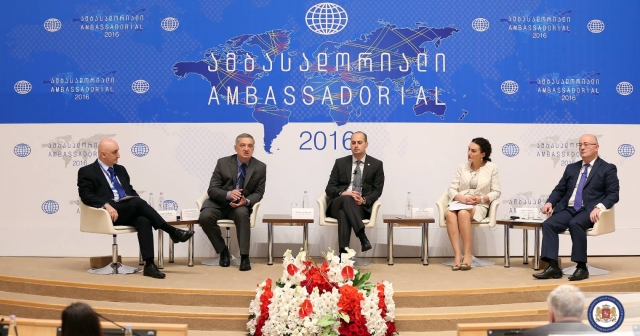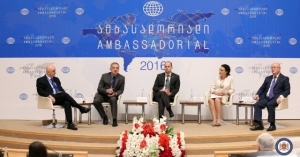Georgia’s Ambassadors Meet to Discuss Foreign Policy Challenges
The heads of Georgia’s Diplomatic Missions abroad gathered in Tbilisi for an annual meeting running from Wednesday to July 29 to discuss the foreign policy developments of the past year.
In his opening statements at the forum, Foreign Affairs Minister Mikheil Janelidze said Georgia’s main diplomacy aims are maintaining the country’s sovereignty and territorial integrity, Euro-Atlantic integration and strengthening regional ties, as well as supporting and protecting Georgian citizens abroad.
He added that guaranteeing the safety of Georgian citizens has come to the forefront of Tbilisi’s diplomatic mission tasks as the number of deadly terrorist attacks around the world have grown significantly in the last year.
“Georgia’s diplomatic missions will try to find ways of dealing with the current global challenges and keep a close eye on the situation,” said Janelidze.
Georgian Prime Minister of Georgia, Giorgi Kvirikashvili, said the Association Agreement with the European Union, which came into force on July 1, was the country’s single-most important foreign policy development in 2015.
Kvirikashvili said, however, that the process of European integration could not be completed without visa liberalization that would allow Georgian passport holders to travel to the EU visa-free for up to 90 days.
“We hope that a final decision on visa-free travel regime to the EU for Georgian citizens is just a matter of time and that a decision will be made soon,” said Kvirikashvili.
With regards to relations with Russia, Kvirikashvili said, “When 20 percent of our country remains occupied, of course it is impossible to talk about any progress and achievements regarding relations with them (Moscow). However, as a result of our pragmatic policy towards Russia, we have been able to establish the type of dialogue that avoids war and armed confrontations.”
The PM took the time to thank Georgia’s ambassadors and diplomats, highlighting that they play a major role in the country’s ability to develop its economy peacefully and to implement important democratic and economic reforms.
The first days of the Ambassadorial were marked by meetings of Georgia’s ministers with ambassadors to discuss refugees, conflict regions, protection of human rights, recent reforms and the country's course of development. “It is for the ambassadors to choose which information they will spread abroad but we have a lot of innovations and achievements that should be made known to the wider public,” said Minister of Corrections, Kakha Kakhishvili.
One of the working sessions was devoted to cultural diplomacy, which was named one of the priorities of the Georgian government. Economic diplomacy and the external image of the country were also discussed. For the first time ambassadors had the opportunity to meet with representatives of about 20 business associations and unions where they learned about current reforms and plans of the ministries, support of the business and private sector, and about lobbying business abroad.
“We believe that contact between our diplomats and businessmen is very important, and in the framework of our forum, they were given the opportunity to talk face-to-face about attracting investment, business development, privileges for Georgian business and more,” said Minister Janelidze.
The guests of honor of the ambassadorial side were the representatives of the ministries of foreign affairs of India and Hungary, who spoke about the foreign policy of their countries, cooperation with Georgia and experiences.
The first annual meeting of Georgia’s diplomatic corps was held in 1995 and presided over by then-Foreign Minister Irakli Menagarishvili, who brought Georgian and foreign diplomats together at the State Chancellery in Tbilisi to discuss plans for developing the country, regional relations and future prospects.
Eka Karsaulidze
Edited by Katie Ruth Davies












